Sung Yi-chen (宋宜臻) and Lee Yi-ho (李翊禾) went from designing the latest new smartphones to washing cups.
Not just any cups, but reusable containers that they’ve made available at a Tainan shopping district through their fledgling cup-lending service, GoodToGo (好盒器).
“Our previous jobs were to design features that would encourage people to discard their phone for the newest model,” Sung says. “It just didn’t seem right to be putting so many resources into endlessly upgrading the quality of a product.”
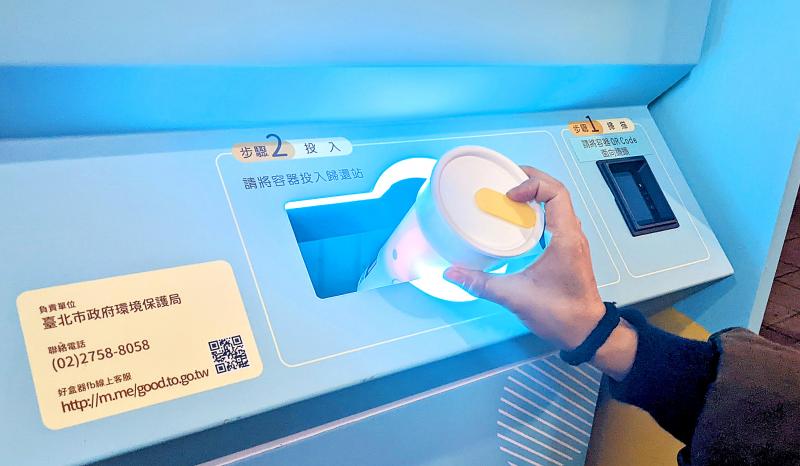
Photo: Han Cheung, Taipei Times
Today, professional cleaners sanitize their cups, and GoodToGo’s business has expanded from Tainan to Taipei, partnering with the city’s Environmental Protection Bureau. Drink shops, restaurants and convenience stores offering their product can be seen around the Gongguan (公館) area and Taipei Main Station.
Taiwan discards about 2 billion single-use cups every year, Sung says, but with government incentives and a public more aware of the importance of sustainability, now is an ideal time to see if consumers are open to engaging in their lending scheme.
The process is simple: register for the service on LINE (Chinese only), visit a participating store, request the cup and scan a QR code. The cups can also be obtained at kiosks.
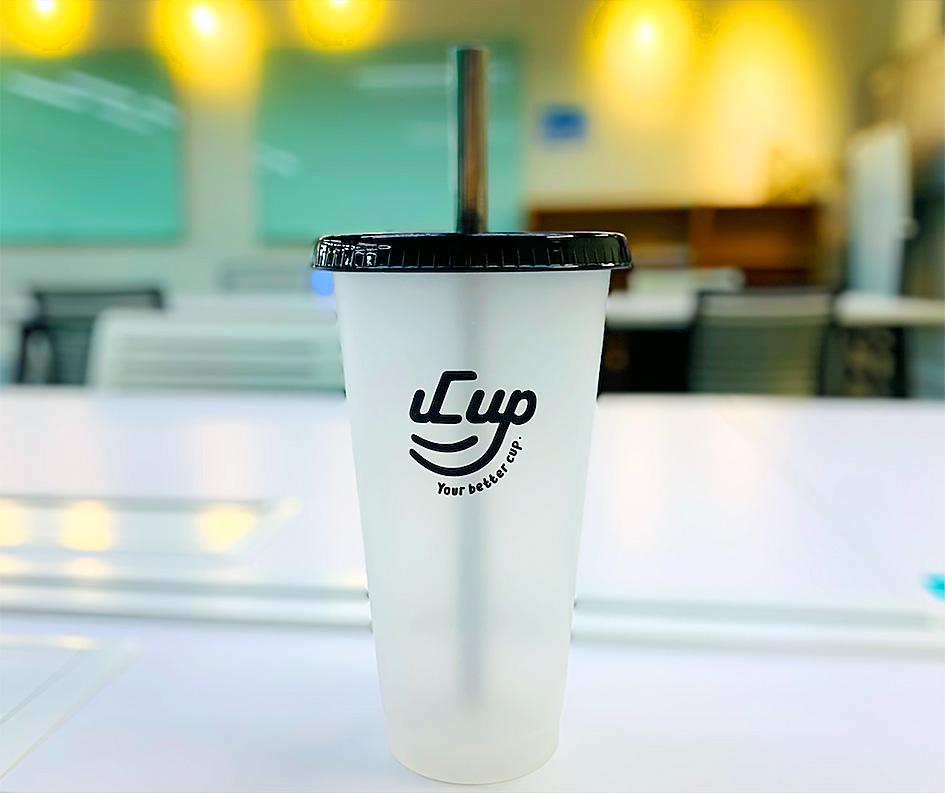
Photo courtesy of uCup
GoodToGo isn’t the only reusable cup provider. uCup, a venture launched in 2018 by National Taiwan University (NTU) students, provides a similar service for drink shops on campus and in Gongguan. Unlike GoodToGo, uCup’s target market is university students.
CONVENIENCE AND CLEANLINESS
Both companies agree that the only way to get customers and businesses to embrace the idea is to make the service as convenient as possible.
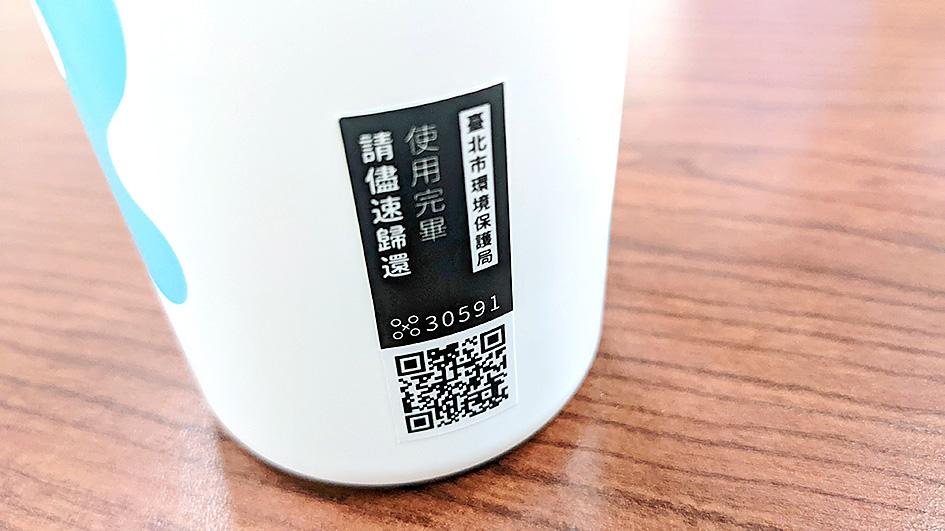
Photo: Han Cheung, Taipei Times
“Many will say that Taiwan needs better policies and stricter rules to [enforce eco-friendly behavior],” uCup cofounder Thomas Li (李博華) says. “But I disagree. People like disposable cups because they are convenient. Our job is to ensure that the service is just as quick, and doesn’t interrupt the store’s workflow.”
But, he adds, “we are still working out the kinks.”
Sung and Lee began with three shops in Tainan’s Jhongsing Commercial District (中興商圈), and later expanded to large events and concerts, including this past weekend’s Megaport Music Festival (大港開唱).
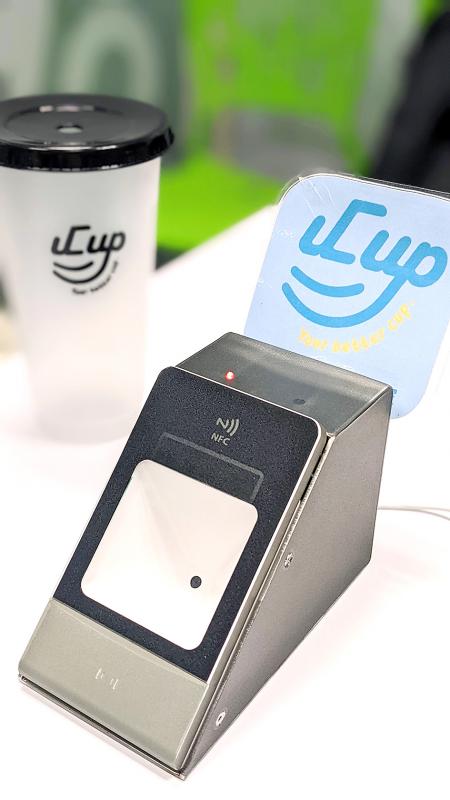
Photo: Han Cheung, Taipei Times
With a proposed law mandating fast food restaurants and convenience store chains provide reusable cups in 5 percent of their stores by January next year, McDonalds and 7-Eleven are also experimenting with the service. The proposed law also requires stores to provide NT$5 discounts by July to consumers with reusable cups.
During last year’s outbreak, delivery platform FoodPanda also began offering GoodToGo containers.
uCup, on the other hand, started as an advocacy project by NTU’s student association. Co-founder Ting Chi-shao (丁啟詔) took over the venture after it ended, and recruited classmates to keep it running as a school club.
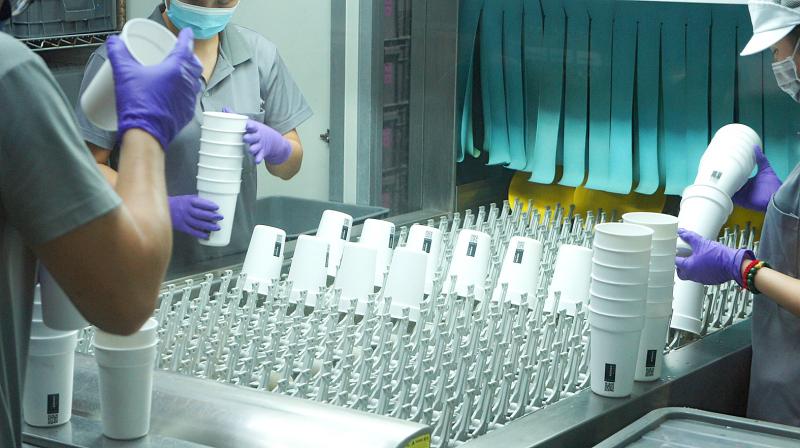
Photo courtesy of GoodToGo
Li says that when Ting approached him, he was still a regular user of single-use cups.
“I recycle, but not everything can be solved by recycling,” he says.
As students, it’s easier to obtain school resources and local support, and faculty from different departments pitched in their expertise. As the club grew, uCup entered various competitions — including the U-Start campus entrepreneurship angel fund, which requires them to become a social enterprise.
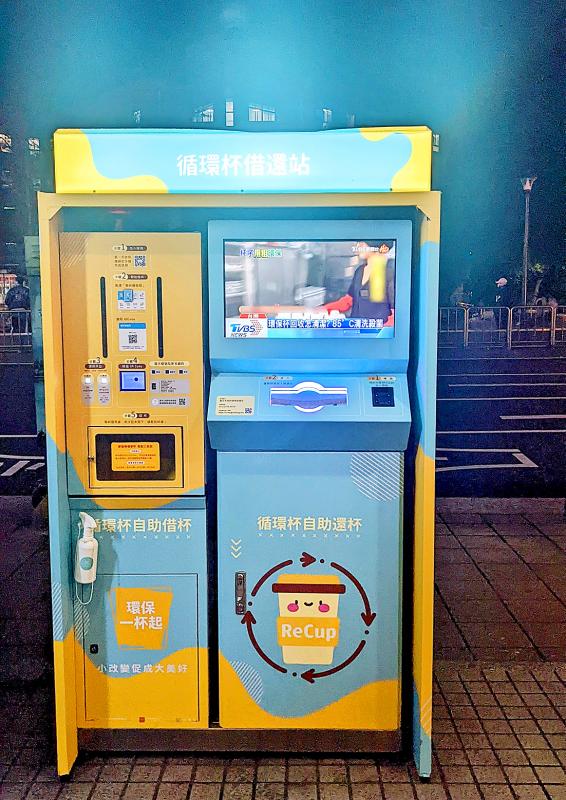
Photo: Han Cheung, Taipei Times
ZERO INTRUSION
Chiang Yi-chieh (江依潔), owner of Daily Dae (黛黛茶), a tea shop near NTU, has both GoodToGo and uCup options.
Every day there are a handful of customers who request reusable cups, most of them NTU students. GoodToGo is more popular with large FoodPanda orders.
Chiang predicts that the service will increase as word spreads and the summer heat brings more patrons. In addition to supporting young entrepreneurs and the environment, she says it’s good to get a head start as the government continues its push to eliminate single-waste plastics.
While reporting on this story, I tried uCup’s service. It was easy enough to learn the system, and the vendors were helpful if their shop wasn’t busy. Once I left the participating commercial district, however, there was no place to return the cup and, after three days, my account was suspended.
Both companies say this is just the beginning of a long process to make reusable cups a standard option for consumers and businesses. Competition in the beverage industry is fierce, so the service needs to be fluid.
“It’s not that people don’t want to [be] environmentally [friendly], there just aren’t the resources available,” Sung says.
While uCup has become well-known on the NTU campus, Li says they need to target those who “sympathize with the polar bears but still blast the AC when it’s hot.”
“By nature, humans want comfort and convenience,” he adds. “So we tell them we’ve devised a way for them to help the environment with little extra effort.”
WHO PAYS?
Both companies offer the service for free to consumers, collecting a fee from the vendors.
Instead of requiring a cash deposit, Sung discovered that repeatedly warning delinquent users through text messages and suspending their accounts after three days is the most effective way to maintain the cup return rate, which she says is 98.7 percent
Sung adds that is has been harder to recruit stores in Taipei due to costs and competition, but the government has stepped up by sponsoring the first 50 stores that sign on.
GENERATING REVENUE
As a free service, generating steady revenue is still a work in progress, but Sung says it’s important to offer a model to promote awareness, not only among consumers but among larger drink chains.
“From a society perspective, we feel that this service should exist no matter what,” she says. “We can eventually work out a healthy commercial model.”

In the March 9 edition of the Taipei Times a piece by Ninon Godefroy ran with the headine “The quiet, gentle rhythm of Taiwan.” It started with the line “Taiwan is a small, humble place. There is no Eiffel Tower, no pyramids — no singular attraction that draws the world’s attention.” I laughed out loud at that. This was out of no disrespect for the author or the piece, which made some interesting analogies and good points about how both Din Tai Fung’s and Taiwan Semiconductor Manufacturing Co’s (TSMC, 台積電) meticulous attention to detail and quality are not quite up to

April 21 to April 27 Hsieh Er’s (謝娥) political fortunes were rising fast after she got out of jail and joined the Chinese Nationalist Party (KMT) in December 1945. Not only did she hold key positions in various committees, she was elected the only woman on the Taipei City Council and headed to Nanjing in 1946 as the sole Taiwanese female representative to the National Constituent Assembly. With the support of first lady Soong May-ling (宋美齡), she started the Taipei Women’s Association and Taiwan Provincial Women’s Association, where she

It is one of the more remarkable facts of Taiwan history that it was never occupied or claimed by any of the numerous kingdoms of southern China — Han or otherwise — that lay just across the water from it. None of their brilliant ministers ever discovered that Taiwan was a “core interest” of the state whose annexation was “inevitable.” As Paul Kua notes in an excellent monograph laying out how the Portuguese gave Taiwan the name “Formosa,” the first Europeans to express an interest in occupying Taiwan were the Spanish. Tonio Andrade in his seminal work, How Taiwan Became Chinese,

Mongolian influencer Anudari Daarya looks effortlessly glamorous and carefree in her social media posts — but the classically trained pianist’s road to acceptance as a transgender artist has been anything but easy. She is one of a growing number of Mongolian LGBTQ youth challenging stereotypes and fighting for acceptance through media representation in the socially conservative country. LGBTQ Mongolians often hide their identities from their employers and colleagues for fear of discrimination, with a survey by the non-profit LGBT Centre Mongolia showing that only 20 percent of people felt comfortable coming out at work. Daarya, 25, said she has faced discrimination since she